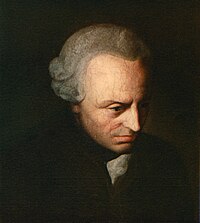| Part of a series on |
| Immanuel Kant |
|---|
 |
|
Category • |
The political philosophy of Immanuel Kant (1724–1804) favoured a classical republican approach.[1][2] In Perpetual Peace: A Philosophical Sketch (1795), Kant listed several conditions that he thought necessary for ending wars and creating a lasting peace. They included a world of constitutional republics by establishment of political community.[3] His classical republican theory was extended in Doctrine of Right (1797), the first part of Metaphysics of Morals.[4] At the end of the 20th century Kant's political philosophy had been enjoying a remarkable renaissance in English-speaking countries with more major studies in a few years than had appeared in the preceding many decades.[5]
- ^ Kant’s Principles of Politics, including his essay on Perpetual Peace. A Contribution to Political Science, translation by W. Hastie, Edinburgh: Clark, 1891.
- ^ Varaba, Dinebari D.; Berebon, Charles N. (2021). "The Philosophy of Law of Immanuel Kant". Tamaddun. 20 (2): 271–282. doi:10.33096/tamaddun.v20i2.166.
- ^ Kant, Immanuel. Perpetual Peace. Trans. Lewis White Beck (377). For a summary and
- ^ Manfred Riedel Between Tradition and Revolution: The Hegelian Transformation of Political Philosophy, Cambridge 1984
- ^ Smith, A. Anthony (1985-04-01). "Kant's Political Philosophy: Rechtsstaat or Council Democracy?". The Review of Politics. 47 (2): 253–280. doi:10.1017/s003467050003672x. JSTOR 1406673. S2CID 144847787.